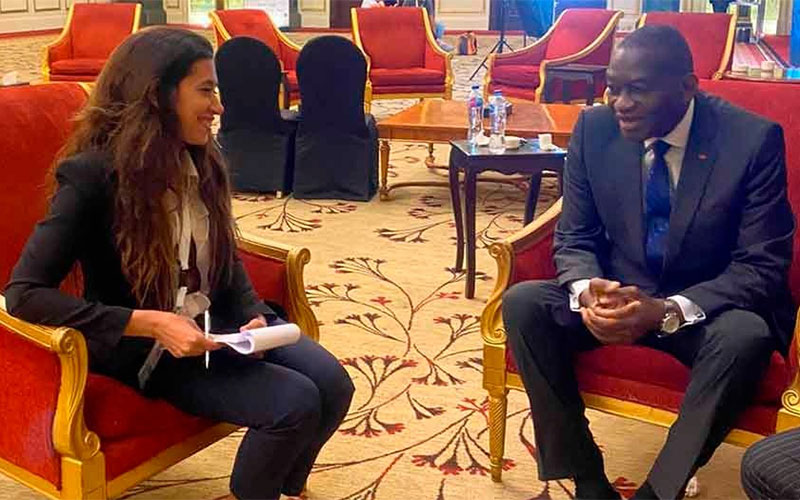Based on the principle that Egypt will continue to endeavour side by side with African countries to achieve sustainable development, as President Abdel Fattah El-Sisi affirmed in May, and that it is ready to offer its expertise to any African state, as recently stated by Prime Minister Mostafa Madbouly, Cote d'Ivoire is the new landing place to implement such Egyptian pledge.
Three Egyptian delegations that aim to explore investment opportunities in construction, infrastructure and food security are working in Cote D'Ivoire, according to Toure Gaoussou, the Cote d’Ivoire’s Minister Governor of Denguélé District, and Hassan Abdel-Aziz, and the Chairman of the African Federation for Construction Contractors’ Association (AFCCA).
“A delegation includes representatives from Egypt’s most renowned construction companies is scheduled to head to the Ivoirian capital of Abidjan this week to discuss plans of building 20,000 middle and low-income housing units to tackle deficit problem in the capital,” Abdel-Aziz told Ahram Online on Monday on the sidelines of 7th edition of Builders of Egypt Forum in Cairo.
Abdel-Aziz said the delegation, whose visit is in coordination between the Egyptian embassy in Cote d'Ivoire and the AFCCA, will also discuss a plan to construct 15 towers.
For his part, Gaoussou expressed to Ahram Online his admiration of the mega housing projects in Egypt, adding that his country is in desperate need of building 500,000 housing units annually to absorb population growth.
Abdel-Aziz noted that Hassan Allam Holding and Al-Ahly Sabour for Real Estate Development are the most nominated companies to take over the housing project.
Another AFCCA delegation will head next week to Cote d’Ivoire to discuss building an 86-kilometer road in the northwestern district of Denguélé, according to Gaousou, who attended the forum.
According to the World Bank Economic Outlook in 2019, the northern and northwestern regions of Cote d’Ivoire have higher poverty rates (over 60 percent) than coastal areas and the southwestern region (under 40 percent).
Gaoussou said that next week’s delegation would be the third Egyptian delegation, as an Egyptian agriculture-focused delegation has already been to Cote d’Ivoire “to transfer Egypt’s experience in modern agriculture and the implantation of rice.”
Such cooperation will save a fortune for the country, which imports rice for 800 million CFA franc ($1.2 million) annually, the minister noted.
During the opening of the Builders of Egypt Forum on Monday, Madbouly said that all Egyptian construction companies and engineering consultancy offices are ready to carry out any project in Arab and African countries with high international standards and within scheduled times.
The annual Builders of Egypt Forum is the country’s largest of its kind in the construction sector, bringing together Egyptian, Arab, and African ministers in the sectors of housing, investment, and services. A number of foreign ambassadors and heads of relevant federations and business organisations were also among the attendees.
The 2022 edition of the forum was organised by the Egyptian Excellent Communications company, a subsidiary of United Media Services, and the Egyptian African Arab Co. for Development (EGAAD) in cooperation with the AFCCA.
Elsewhere in Africa
Egypt has been expanding its presence in Africa by carrying out mega projects that meet African peoples’ needs.
In January, President El-Sisi said that Egypt is ready to transfer its expertise to African countries to help them and encourage others to support them. “It is our duty towards them, and this is considered a human right,” the president said.
In late-May, speaking on the occasion of Africa Day 2022, El-Sisi described the occasion as “a great historical moment that established a new era in strengthening unity and cooperation between the countries of our continent.”
Among the African countries where Egypt has been working to implement industrial and development projects goals is Tanzania.
The Egyptian Elsewedy Electric has been building the Egyptian Industrial City (EIC) in Tanzania at a cost of nearly $400 million, a complex that was awarded the best project in Africa, according to the head of research at the African Export-Import Bank (Afreximbank) Frederick Seidu on Monday.
The EIC is the first fully integrated industrial city in Tanzania intended to become a centre for economic growth in Africa, according to Elsewedy, who inaugurated the first phase of the industrial complex in December in the presence of Tanzanian President Samia Hassan.
Built on 2.2 million square meters, the industrial park will accommodate labour-intensive industries from pharmaceuticals, automotives, to textiles and agro-industries with the aim of attracting over $400 million worth of investments from 4,100 investors across the region, which would create more than 25,000 jobs, according to Elsewedy’s website.
The industrial city is strategically located with access and proximity to the commercial capital Dar Es Salam, Julius Nyerere International Airport, Kamata Train Station, and Tanzania International Container Terminal as well as Elsewedy manufacturing plants.
The complex will also produce the solutions and equipment necessary for the 2025 Industrialisation Strategy of Tanzania and will create more than 500 jobs for talented youths and technical engineers in the first phase alone.
Elsewhere in Tanzania, Elsewedy Electric and the Arab Contractors Company has been constructing the country’s Julius Nyerere Hydroelectric Power Project (JNHPP) since 2019.
Last week, Egypt’s Minister of Housing Assem El-Gazzar had an inspection tour of the 2,115 MW hydropower project constructed on the Rufiji River, where she said “the project has reached advanced levels.”
Work on the $2.9 billion JNHPP has been ongoing since 2019 and is expected to be completed by the end of this year, when it will provide clean power for more than 60 million Tanzanians as well as control water flow during flooding.

The JNHPP is 1,025 metres long at the summit and 131 metres high with a storage capacity of about 34 billion cubic metres of water.
The JNHPP is expected to produce 5,920 GWh of power annually.
Short link: